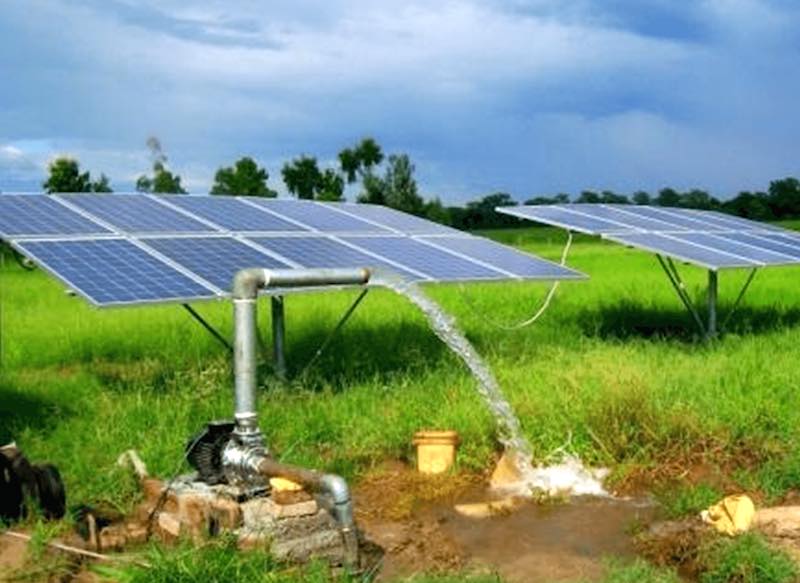(ThyBlackMan.com) It doesn’t matter if you’re managing a happy little off-grid homestead, a bustling ranch, or a farm far away from the electrical grid, establishing a safe, secure, and cost-effective water supply must be one of your top concerns.
So, suppose you’re prepared to install a new water pump or replace an aging system. In that case, you should consider all of your potential options. While solar water pumps may not have been a practical or attractive solution in the past, major improvements to solar energy technology have made them much more competitive.
Potential Applications
One of the many advantages of a solar water pump is the ability to scale the number of panels to meet different needs. Homeowners and businesses can both source a solar water pump from a major provider that’s the right size for their operation.
Personal and Home Use:
Homesteads and other off-grid houses can greatly benefit from adding a solar water pump to the property. Any electronic solution will greatly reduce the daily burden of hauling or manually pumping the daily water needed for bathing, drinking, and gardening. Even some on-grid homes may find a solar-powered pump useful for supplying artificial ponds or fixtures that are not already connected to the main utility lines.
Agricultural:
Farms and ranches can also utilize solar water pump systems to bring a stable water supply to distant fields and pastures. Solar pumps are well suited to supplying water to troughs and tanks for daily use and storage. Farms using drip irrigation systems can also incorporate solar power to supply steady water to their plants throughout the day.

Is a Solar Water Pump Worth the Money?
Before you commit to a new water pump project, you’ll obviously need to narrow down the power source. While some locations may be able to get a quote for connecting a pump to the electric grid, the high upfront costs can often make this impractical, if it’s even an option. Windmill water pump systems are also available, but they tend to have equally high installation costs and more complicated maintenance. Generally, the choice comes down to a solar power system or a generator.
Installation Expenses
It doesn’t take too many quotes to see the biggest drawback to a solar water pump. The installation costs tend to be noticeably higher compared to an equivalent diesel or gasoline generator. While solar panels have decreased substantially in price, they’re still not a cheap investment. By comparison, generators just need a little preparation to level the ground and set up the connections.
However, anyone planning to use their solar water pump for a drip irrigation system will also likely need to invest in a battery backup to handle cloudy days. This isn’t always necessary for personal water supplies or livestock use since it may be possible to rely on water tanks to store excess water on sunny days. This still factors into the initial cost, though.
Maintenance and Replacement
Once the system is installed, it won’t be too long before it’s time to consider maintenance and part replacement. Maintenance isn’t too different for the two systems. Solar panels will need to be cleaned occasionally, while generators will need to be inspected and kept oiled. Generator upkeep may take a little more label and cost, but it’s not going to be the defining factor. It is worth remembering the daily time lost to starting and stopping the generator.
Long-term care is a different story – all thanks to the longer lifespan of a solar water pump. Solar panels can now function for an average of 25 years, which is going to outlast any generator even after factoring in replacement parts greatly. While having to replace dead batteries in a solar system reduces this benefit, it still leaves the solar water pump coming out ahead of a generator over a long time frame.
Operating Costs
The financial equation completely flips once it’s time to consider the day-to-day running of the pump. Solar water pumps will get all of their energy from natural sunlight. This means the marginal cost of running the pump is zero. Compare this to the generator, which will need gasoline or diesel fuel for every minute that it’s working.
You can look at a recent study that examined Brazilian farms that had invested in solar water pumps. Even though the solar panels also included a battery system that needs replacement approximately every four years, the solar water pump still proved to be a good investment. While it costs nearly five times as much as for implementing a diesel generator, fuel cost savings still cleared the difference (Grah, 2014).
Are You Ready to Invest?
The tools to analyze your potential investment are now all in front of you. Take the time to calculate your water supply’s needs and volume and then look at what a solar-powered pump will cost. Just remember to compare it to the years of fuel that a seemingly cheaper generator system will require.
If it looks like a solar water pump is the right choice for you, then you can reach out to licensed professionals in your region. They can help plan, compare, and safely set up any electrical system you need. Suppose you don’t know or can’t easily find relevant professionals near you. In that case, you can also approach a leading manufacturer or provider for a list of people who can help. Consulting with an expert is important!
Staff Writer; Bobby Hall

















Leave a Reply